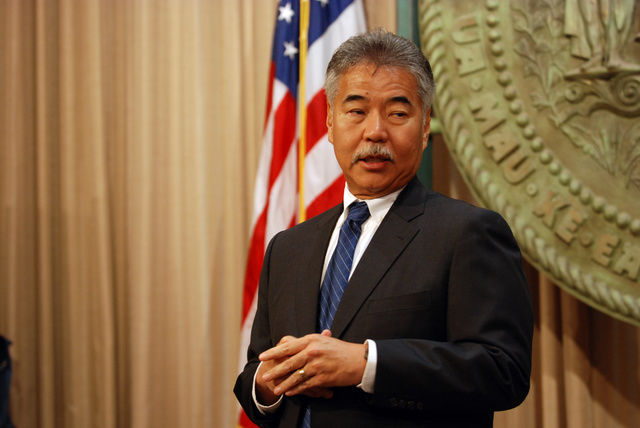HONOLULU — Hawaii Gov. David Ige outlined the broad strokes of his policy agenda for the upcoming year, promising to focus on affordable housing, homelessness and conditions in public schools in a speech that paid homage to the state’s past
HONOLULU — Hawaii Gov. David Ige outlined the broad strokes of his policy agenda for the upcoming year, promising to focus on affordable housing, homelessness and conditions in public schools in a speech that paid homage to the state’s past while embracing the need for change.
Ige began his annual State of the State address Monday by recognizing the Maui workers who are losing their jobs as the state’s last sugar plantation closes down.
“Sugar is gone, as are many other aspects of the Hawaii we once knew,” Ige added. “In their place, however, there is an exciting new world beckoning us.”
Ige told a crowd of lawmakers, officials and citizens that he’s committed to pursuing the Thirty Meter Telescope project even though the state Supreme Court invalidated the permit.
“The unrelenting search for truth, knowledge and understanding is an essential part of our human makeup,” Ige said. “It helps us become who we are. So does our obligation to be true to our past and cultural heritage.”
Construction was halted on the $1.4 billion project in April after protesters blocked construction of the telescope atop Mauna Kea, a mountain held sacred by many Native Hawaiians.
“In its recent ruling, the Supreme Court did not say don’t do this project,” Ige said. “What it did say was that the state didn’t do the right things in the approval process. It told us we needed to do a better job of listening to people and giving them a real opportunity to be heard.”
Affordable housing and homelessness are key parts of the governor’s and Legislature’s priorities this year. To help address homelessness, the state is in the final stages of building a new shelter that can provide short-term shelter for up to 240 people per year, Ige said. His budget also includes money for crews to clear homeless encampments.
“On the one hand, we need to ensure that our parks and sidewalks remain open and safe for all to use,” Ige said. “But we will do this with compassion and respect, especially when families with young children are involved.”
Hawaii is investing $5 million to jumpstart a new partnership with Aloha United Way, which is expected to provide immediate relief to 1,300 households, Ige said.
The state needs an estimated 66,000 housing units in the coming years, so Ige is seeking more money to provide loans to developers for low-income rentals. Private sector developments will provide more than 10,000 units in the next few years, Ige said.
The biggest roadblock to developing more housing is the lack of adequate infrastructure, so Ige is asking for a $25 million increase to fund infrastructure improvements, he said.
“I think that with all of us working together, you’ll see something by the end of the session, I’m hoping something creative,” said Sen. Majority Leader J. Kalani English. “I’m hoping something beyond just putting dollars at it, even though we need to do that as well.”
Ige unveiled a plan to cool 1,000 public school classrooms by the end of the year by using $100 million of Green Energy Market Securitization Funds on energy-efficient cooling solutions. He said the first step in cooling schools is to reduce energy use in each building, and that it’s important to do electrical and lighting upgrades before adding air conditioning units to buildings.
Rep. Chris Lee, chairman of the House Energy and Environmental Protection Committee, called Ige’s school cooling program “groundbreaking.”
“It’s taking advantage of that technology in a way that has perhaps never been taken advantage of before on this scale, and it’s our kids who are going to be the ones to benefit,” Lee said.
Ige said he wants to ensure that the state takes care of its unfunded pension and benefit liabilities for state retirees, and he’s pushing a plan to more aggressively pay down the state’s obligations to those workers. Ige also is encouraging the state to do a better job of spending federal money.
“In some cases, the state has struggled to spend federal monies in a timely way,” Ige said. “This issue has vexed us for too long.”


